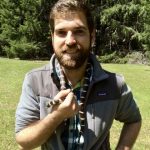 Robert Cooper uses modern quantitative techniques to understand contemporary conservation issues. He received his PhD with the Shaffer Lab in 2021. His dissertation focused on the issue of non-native hybridization in the endangered California Tiger Salamander (CTS) system. Robert has used gene expression analyses to understand differences in thermal tolerance (CTMax) between native and non-native CTS. He also constructed large naturalistic ponds in Monterey County to study the effects of pond duration on non-native salamander fitness. Robert then adapted a recent demographic model to predict the success of non-native hybrids under various management scenarios. Currently, Robert is working on a rapid detection protocol to identify and remove non-native CTS in Sonoma County to prevent widespread introgression. Robert Cooper uses modern quantitative techniques to understand contemporary conservation issues. He received his PhD with the Shaffer Lab in 2021. His dissertation focused on the issue of non-native hybridization in the endangered California Tiger Salamander (CTS) system. Robert has used gene expression analyses to understand differences in thermal tolerance (CTMax) between native and non-native CTS. He also constructed large naturalistic ponds in Monterey County to study the effects of pond duration on non-native salamander fitness. Robert then adapted a recent demographic model to predict the success of non-native hybrids under various management scenarios. Currently, Robert is working on a rapid detection protocol to identify and remove non-native CTS in Sonoma County to prevent widespread introgression. |
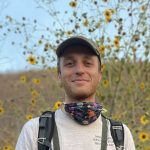 Joseph Curti is a Ph.D. student interested in applying whole-genome sequencing to California conservation management. Joey’s current research projects include 1) the impacts of long-term isolation and small population size on California red-legged frogs (Rana draytonii) in the Santa Monica Mountains, 2) the impacts of roads on the genetic health and population connectivity of California quail (Callipepla californica), and 3) population structure and signatures of local adaptation of the Yuma bat (Myotis yumanensis). He works closely with the National Park Service (Santa Monica Mountains) and the California Conservation Genomics Project. For more information, visit Joey’s website. Joseph Curti is a Ph.D. student interested in applying whole-genome sequencing to California conservation management. Joey’s current research projects include 1) the impacts of long-term isolation and small population size on California red-legged frogs (Rana draytonii) in the Santa Monica Mountains, 2) the impacts of roads on the genetic health and population connectivity of California quail (Callipepla californica), and 3) population structure and signatures of local adaptation of the Yuma bat (Myotis yumanensis). He works closely with the National Park Service (Santa Monica Mountains) and the California Conservation Genomics Project. For more information, visit Joey’s website.
|
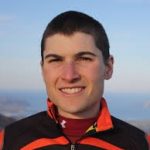 Dave Daversa is interested in optimizing landscape connectivity for endangered species threatened by disease. In collaboration with the National Park Service, he is working on better understanding movement and infection risk in endangered Yosemite toads, with the goal of developing data-driven re-introduction strategies to strengthen their vulnerable populations. Dave received his PhD in 2016 from the University of Cambridge, and then went on to do postdocs at the Institute for Integrative Biology, University of Liverpool and the National Great Rivers Research and Education Center in Alton, Illinois. Dave Daversa is interested in optimizing landscape connectivity for endangered species threatened by disease. In collaboration with the National Park Service, he is working on better understanding movement and infection risk in endangered Yosemite toads, with the goal of developing data-driven re-introduction strategies to strengthen their vulnerable populations. Dave received his PhD in 2016 from the University of Cambridge, and then went on to do postdocs at the Institute for Integrative Biology, University of Liverpool and the National Great Rivers Research and Education Center in Alton, Illinois. |
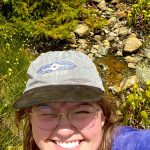 Madison Evanow recently completed an undergraduate degree in EEB at UCSC where they participated in research involving plant genomics and forest disease ecology. Madison joined the Shaffer Lab as a lab technician in March 2024. They are an avid botanist who is particularly fascinated by the processes driving a rich diversity of species in the California Floristic Province. Madison is interested in plant-microbe interactions and plans to study plant pathology within the frameworks of evolutionary genomics and landscape ecology. Madison Evanow recently completed an undergraduate degree in EEB at UCSC where they participated in research involving plant genomics and forest disease ecology. Madison joined the Shaffer Lab as a lab technician in March 2024. They are an avid botanist who is particularly fascinated by the processes driving a rich diversity of species in the California Floristic Province. Madison is interested in plant-microbe interactions and plans to study plant pathology within the frameworks of evolutionary genomics and landscape ecology. |
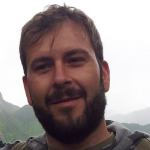 Cristian Gruppi (Cri) is a biologist with a background in biochemistry and molecular biology. He joined the Center for Tropical Research (UCLA, IoES) in July 2018, and the CCGP/Shaffer lab in September 2022. He is particularly interested in exploring and harnessing the advantages of Next Generation Sequencing tools and genomics techniques for the conservation and management of wild animal populations. Cri is also supported under a U.S. Department of Energy project focused on genetically characterizing “feather spots” collected at solar facilities and understanding demographic impacts of solar energy sites on avian populations. For the CCGP, he will be working with Andrew Tully to help increase our whole genome resequencing throughput at the MiniCore. Cristian Gruppi (Cri) is a biologist with a background in biochemistry and molecular biology. He joined the Center for Tropical Research (UCLA, IoES) in July 2018, and the CCGP/Shaffer lab in September 2022. He is particularly interested in exploring and harnessing the advantages of Next Generation Sequencing tools and genomics techniques for the conservation and management of wild animal populations. Cri is also supported under a U.S. Department of Energy project focused on genetically characterizing “feather spots” collected at solar facilities and understanding demographic impacts of solar energy sites on avian populations. For the CCGP, he will be working with Andrew Tully to help increase our whole genome resequencing throughput at the MiniCore. |
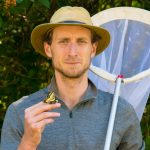 Zachary MacDonald is broadly interested in ecological and evolutionary mechanisms that structure biodiversity in space and time. Throughout his Ph.D. at the University of Alberta, much of Zac’s work focused on conservation applications of theoretical ecology, evaluating relationships between habitat loss, habitat fragmentation, and emergent patterns of species diversity. Since then, Zac has focused on evaluating effects of habitat and climate changes on a reduced number of species, but in greater detail. Much of this research is aimed at advancing the field of landscape genomics, providing a valuable toolkit for identifying present and future threats to species of conservation concern. As a La Kretz Center Postdoctoral Fellow in the Shaffer Lab, Zac is now applying landscape genomics to a number to of threatened and alpine butterfly species throughout western North America to better inform conservation practice. Zachary MacDonald is broadly interested in ecological and evolutionary mechanisms that structure biodiversity in space and time. Throughout his Ph.D. at the University of Alberta, much of Zac’s work focused on conservation applications of theoretical ecology, evaluating relationships between habitat loss, habitat fragmentation, and emergent patterns of species diversity. Since then, Zac has focused on evaluating effects of habitat and climate changes on a reduced number of species, but in greater detail. Much of this research is aimed at advancing the field of landscape genomics, providing a valuable toolkit for identifying present and future threats to species of conservation concern. As a La Kretz Center Postdoctoral Fellow in the Shaffer Lab, Zac is now applying landscape genomics to a number to of threatened and alpine butterfly species throughout western North America to better inform conservation practice.
|
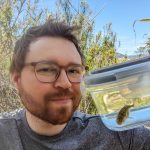 Andrew Sharo is interested in the welfare of animals living in the wild and what we can do to responsibly improve their lives. Wild animal welfare is a nascent field but has great potential, particularly to improve our ability to predict population trends, model animal behavior, and conserve imperiled species. Andrew received his PhD from UC Berkeley, where he was an NSF graduate research fellow. Trained in genetics and computational biology, Andrew has worked on projects ranging from rare medical diseases to steelhead trout population genetics. His research in the Shaffer lab focuses on identifying reliable welfare biomarkers in some of the most numerous vertebrates in the world, amphibians and fishes. For more information, visit Andrew’s website. Andrew Sharo is interested in the welfare of animals living in the wild and what we can do to responsibly improve their lives. Wild animal welfare is a nascent field but has great potential, particularly to improve our ability to predict population trends, model animal behavior, and conserve imperiled species. Andrew received his PhD from UC Berkeley, where he was an NSF graduate research fellow. Trained in genetics and computational biology, Andrew has worked on projects ranging from rare medical diseases to steelhead trout population genetics. His research in the Shaffer lab focuses on identifying reliable welfare biomarkers in some of the most numerous vertebrates in the world, amphibians and fishes. For more information, visit Andrew’s website. |
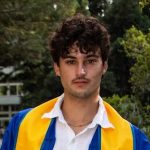 Ben Thompsky joined the Shaffer Lab in February of 2024, where he has been working on the California Tiger Salamander genomics projects. Ben is a recent graduate from the UC Santa Cruz Biomolecular Engineering program. He is interested in conservation genomics and particularly de-extinction through genetic engineering. He hopes to further these goals by studying genetic rescue and creating new genetic tools for improved DNA synthesis and large scale editing technology. Ben Thompsky joined the Shaffer Lab in February of 2024, where he has been working on the California Tiger Salamander genomics projects. Ben is a recent graduate from the UC Santa Cruz Biomolecular Engineering program. He is interested in conservation genomics and particularly de-extinction through genetic engineering. He hopes to further these goals by studying genetic rescue and creating new genetic tools for improved DNA synthesis and large scale editing technology. |
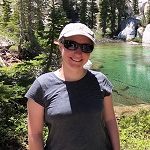 Erin Toffelmier uses genomic tools to understand how the environment and landscape features interact and lead to species distributional patterns and the process of speciation in natural systems. Her primary study system is the alligator lizard genus Elgaria, where she is studying diversification at levels from recent speciation through phylogeography to local, population-level analyses. Erin is also dedicated to conservation-based research, and her work on metapopulation dynamics in critically endangered Santa Barbara tiger salamanders and isolated populations of threatened Panamint alligator lizards is helping manage both. After receiving her PhD from UCLA in 2019, Erin is now Associate Director of the California Conservation Genomics Project. Erin Toffelmier uses genomic tools to understand how the environment and landscape features interact and lead to species distributional patterns and the process of speciation in natural systems. Her primary study system is the alligator lizard genus Elgaria, where she is studying diversification at levels from recent speciation through phylogeography to local, population-level analyses. Erin is also dedicated to conservation-based research, and her work on metapopulation dynamics in critically endangered Santa Barbara tiger salamanders and isolated populations of threatened Panamint alligator lizards is helping manage both. After receiving her PhD from UCLA in 2019, Erin is now Associate Director of the California Conservation Genomics Project. |
 Robert Cooper uses modern quantitative techniques to understand contemporary conservation issues. He received his PhD with the Shaffer Lab in 2021. His dissertation focused on the issue of non-native hybridization in the endangered California Tiger Salamander (CTS) system. Robert has used gene expression analyses to understand differences in thermal tolerance (CTMax) between native and non-native CTS. He also constructed large naturalistic ponds in Monterey County to study the effects of pond duration on non-native salamander fitness. Robert then adapted a recent demographic model to predict the success of non-native hybrids under various management scenarios. Currently, Robert is working on a rapid detection protocol to identify and remove non-native CTS in Sonoma County to prevent widespread introgression.
Robert Cooper uses modern quantitative techniques to understand contemporary conservation issues. He received his PhD with the Shaffer Lab in 2021. His dissertation focused on the issue of non-native hybridization in the endangered California Tiger Salamander (CTS) system. Robert has used gene expression analyses to understand differences in thermal tolerance (CTMax) between native and non-native CTS. He also constructed large naturalistic ponds in Monterey County to study the effects of pond duration on non-native salamander fitness. Robert then adapted a recent demographic model to predict the success of non-native hybrids under various management scenarios. Currently, Robert is working on a rapid detection protocol to identify and remove non-native CTS in Sonoma County to prevent widespread introgression. Joseph Curti is a Ph.D. student interested in applying whole-genome sequencing to California conservation management. Joey’s current research projects include 1) the impacts of long-term isolation and small population size on California red-legged frogs (Rana draytonii) in the Santa Monica Mountains, 2) the impacts of roads on the genetic health and population connectivity of California quail (Callipepla californica), and 3) population structure and signatures of local adaptation of the Yuma bat (Myotis yumanensis). He works closely with the National Park Service (Santa Monica Mountains) and the California Conservation Genomics Project. For more information, visit Joey’s website.
Joseph Curti is a Ph.D. student interested in applying whole-genome sequencing to California conservation management. Joey’s current research projects include 1) the impacts of long-term isolation and small population size on California red-legged frogs (Rana draytonii) in the Santa Monica Mountains, 2) the impacts of roads on the genetic health and population connectivity of California quail (Callipepla californica), and 3) population structure and signatures of local adaptation of the Yuma bat (Myotis yumanensis). He works closely with the National Park Service (Santa Monica Mountains) and the California Conservation Genomics Project. For more information, visit Joey’s website. Dave Daversa is interested in optimizing landscape connectivity for endangered species threatened by disease. In collaboration with the National Park Service, he is working on better understanding movement and infection risk in endangered Yosemite toads, with the goal of developing data-driven re-introduction strategies to strengthen their vulnerable populations. Dave received his PhD in 2016 from the University of Cambridge, and then went on to do postdocs at the Institute for Integrative Biology, University of Liverpool and the National Great Rivers Research and Education Center in Alton, Illinois.
Dave Daversa is interested in optimizing landscape connectivity for endangered species threatened by disease. In collaboration with the National Park Service, he is working on better understanding movement and infection risk in endangered Yosemite toads, with the goal of developing data-driven re-introduction strategies to strengthen their vulnerable populations. Dave received his PhD in 2016 from the University of Cambridge, and then went on to do postdocs at the Institute for Integrative Biology, University of Liverpool and the National Great Rivers Research and Education Center in Alton, Illinois. Madison Evanow recently completed an undergraduate degree in EEB at UCSC where they participated in research involving plant genomics and forest disease ecology. Madison joined the Shaffer Lab as a lab technician in March 2024. They are an avid botanist who is particularly fascinated by the processes driving a rich diversity of species in the California Floristic Province. Madison is interested in plant-microbe interactions and plans to study plant pathology within the frameworks of evolutionary genomics and landscape ecology.
Madison Evanow recently completed an undergraduate degree in EEB at UCSC where they participated in research involving plant genomics and forest disease ecology. Madison joined the Shaffer Lab as a lab technician in March 2024. They are an avid botanist who is particularly fascinated by the processes driving a rich diversity of species in the California Floristic Province. Madison is interested in plant-microbe interactions and plans to study plant pathology within the frameworks of evolutionary genomics and landscape ecology. Cristian Gruppi (Cri) is a biologist with a background in biochemistry and molecular biology. He joined the Center for Tropical Research (UCLA, IoES) in July 2018, and the CCGP/Shaffer lab in September 2022. He is particularly interested in exploring and harnessing the advantages of Next Generation Sequencing tools and genomics techniques for the conservation and management of wild animal populations. Cri is also supported under a U.S. Department of Energy project focused on genetically characterizing “feather spots” collected at solar facilities and understanding demographic impacts of solar energy sites on avian populations. For the CCGP, he will be working with Andrew Tully to help increase our whole genome resequencing throughput at the MiniCore.
Cristian Gruppi (Cri) is a biologist with a background in biochemistry and molecular biology. He joined the Center for Tropical Research (UCLA, IoES) in July 2018, and the CCGP/Shaffer lab in September 2022. He is particularly interested in exploring and harnessing the advantages of Next Generation Sequencing tools and genomics techniques for the conservation and management of wild animal populations. Cri is also supported under a U.S. Department of Energy project focused on genetically characterizing “feather spots” collected at solar facilities and understanding demographic impacts of solar energy sites on avian populations. For the CCGP, he will be working with Andrew Tully to help increase our whole genome resequencing throughput at the MiniCore. Zachary MacDonald is broadly interested in ecological and evolutionary mechanisms that structure biodiversity in space and time. Throughout his Ph.D. at the University of Alberta, much of Zac’s work focused on conservation applications of theoretical ecology, evaluating relationships between habitat loss, habitat fragmentation, and emergent patterns of species diversity. Since then, Zac has focused on evaluating effects of habitat and climate changes on a reduced number of species, but in greater detail. Much of this research is aimed at advancing the field of landscape genomics, providing a valuable toolkit for identifying present and future threats to species of conservation concern. As a La Kretz Center Postdoctoral Fellow in the Shaffer Lab, Zac is now applying landscape genomics to a number to of threatened and alpine butterfly species throughout western North America to better inform conservation practice.
Zachary MacDonald is broadly interested in ecological and evolutionary mechanisms that structure biodiversity in space and time. Throughout his Ph.D. at the University of Alberta, much of Zac’s work focused on conservation applications of theoretical ecology, evaluating relationships between habitat loss, habitat fragmentation, and emergent patterns of species diversity. Since then, Zac has focused on evaluating effects of habitat and climate changes on a reduced number of species, but in greater detail. Much of this research is aimed at advancing the field of landscape genomics, providing a valuable toolkit for identifying present and future threats to species of conservation concern. As a La Kretz Center Postdoctoral Fellow in the Shaffer Lab, Zac is now applying landscape genomics to a number to of threatened and alpine butterfly species throughout western North America to better inform conservation practice. Andrew Sharo is interested in the welfare of animals living in the wild and what we can do to responsibly improve their lives. Wild animal welfare is a nascent field but has great potential, particularly to improve our ability to predict population trends, model animal behavior, and conserve imperiled species. Andrew received his PhD from UC Berkeley, where he was an NSF graduate research fellow. Trained in genetics and computational biology, Andrew has worked on projects ranging from rare medical diseases to steelhead trout population genetics. His research in the Shaffer lab focuses on identifying reliable welfare biomarkers in some of the most numerous vertebrates in the world, amphibians and fishes. For more information, visit Andrew’s website.
Andrew Sharo is interested in the welfare of animals living in the wild and what we can do to responsibly improve their lives. Wild animal welfare is a nascent field but has great potential, particularly to improve our ability to predict population trends, model animal behavior, and conserve imperiled species. Andrew received his PhD from UC Berkeley, where he was an NSF graduate research fellow. Trained in genetics and computational biology, Andrew has worked on projects ranging from rare medical diseases to steelhead trout population genetics. His research in the Shaffer lab focuses on identifying reliable welfare biomarkers in some of the most numerous vertebrates in the world, amphibians and fishes. For more information, visit Andrew’s website. Ben Thompsky joined the Shaffer Lab in February of 2024, where he has been working on the California Tiger Salamander genomics projects. Ben is a recent graduate from the UC Santa Cruz Biomolecular Engineering program. He is interested in conservation genomics and particularly de-extinction through genetic engineering. He hopes to further these goals by studying genetic rescue and creating new genetic tools for improved DNA synthesis and large scale editing technology.
Ben Thompsky joined the Shaffer Lab in February of 2024, where he has been working on the California Tiger Salamander genomics projects. Ben is a recent graduate from the UC Santa Cruz Biomolecular Engineering program. He is interested in conservation genomics and particularly de-extinction through genetic engineering. He hopes to further these goals by studying genetic rescue and creating new genetic tools for improved DNA synthesis and large scale editing technology. Erin Toffelmier uses genomic tools to understand how the environment and landscape features interact and lead to species distributional patterns and the process of speciation in natural systems. Her primary study system is the alligator lizard genus Elgaria, where she is studying diversification at levels from recent speciation through phylogeography to local, population-level analyses. Erin is also dedicated to conservation-based research, and her work on metapopulation dynamics in critically endangered Santa Barbara tiger salamanders and isolated populations of threatened Panamint alligator lizards is helping manage both. After receiving her PhD from UCLA in 2019, Erin is now Associate Director of the California Conservation Genomics Project.
Erin Toffelmier uses genomic tools to understand how the environment and landscape features interact and lead to species distributional patterns and the process of speciation in natural systems. Her primary study system is the alligator lizard genus Elgaria, where she is studying diversification at levels from recent speciation through phylogeography to local, population-level analyses. Erin is also dedicated to conservation-based research, and her work on metapopulation dynamics in critically endangered Santa Barbara tiger salamanders and isolated populations of threatened Panamint alligator lizards is helping manage both. After receiving her PhD from UCLA in 2019, Erin is now Associate Director of the California Conservation Genomics Project.